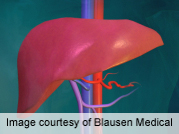Survival benefit for patients with MELD >11; no benefit seen for patients with MELD scores of ≤11
FRIDAY, Jan. 30, 2015 (HealthDay News) — For liver transplantation (LT) recipients with model for end-stage liver disease (MELD) scores above 11, survival benefit increases with decreasing serum sodium values, according to a study published online Dec. 11 in Liver Transplantation.
Pratima Sharma, M.D., from the University of Michigan in Ann Arbor, and colleagues examined the impact of low serum sodium on the survival benefit of LT. Data were collected from 69,213 adults (aged 18 years and older) from the Scientific Registry of Transplant Recipients. Transplant recipients were matched to appropriate candidates then active on the waiting list with the same MELD score and in the same donation service area.
The researchers found that when MELD scores were above 11, LT survival benefit increased significantly with decreasing serum sodium values. For patients with MELD scores of 11 of less, the survival benefit of LT was not affected by serum sodium.
“LT survival benefit (or lack thereof) is independent of serum sodium for patients with MELD scores ≤11,” the authors write. “The increase in survival benefit with decreasing serum sodium among patients with MELD >11 is consistent with recently approved changes to the allocation system incorporating serum sodium.”
Copyright © 2015 HealthDay. All rights reserved.








